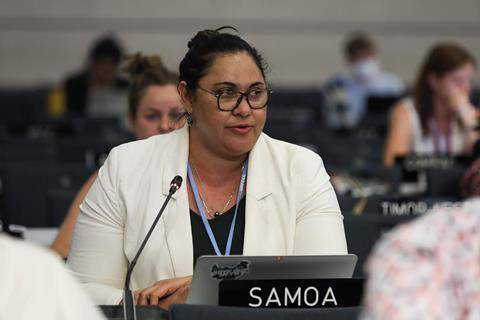Climate change
No sooner had the gavel come down on COP28 then Anne Rasmussen (pictured), the lead negotiator for the Alliance of Small Island States, representing 39 countries, was describing the outcome as ‘a litany of loopholes’ – and receiving a standing ovation in doing so. This is the sort of phrase one might typically expect to have lawyers rubbing their hands in anticipation. On this occasion, there may be just as much handwringing, as we wrestle with the appropriate response in our circumstances.

Some strong signals did emerge from the noise of the conference. One was the acceptance of the inevitability of the demise of fossil fuels. Over 130 countries called for a statement that they should be phased out and, while a small number of others refused to allow that into the final text, they did recognise they could no longer credibly resist any reference to managing its decline.
Similarly, more financial commitments were made to the loss and damage fund created to help the most vulnerable repair the damage from climate breakdown – but not nearly enough to address the need.

So COP28 might reasonably be described as having delivered inadequate progress; and much can be gleaned from a party’s position on the climate emergency by which of these two words they choose to focus on.
Those determined to carry on burning oil and gas for as long as possible – and those happy to support them to do so, whether by providing funding or advice – will concentrate on the progress. Those listening to the scientists becoming increasingly alarmed and forthright about the speed with which the climate is changing, plus those island states and others for whom this is already an existential issue, emphasise the inadequacy of the outcome. Those alive to the reality of our plight, but desperate to remain positive in the face of it, may cling to the whole phrase.
This last is perhaps the most human response, but COP28 also illustrated why it is becoming increasingly difficult to maintain that position through two examples related directly to the issues mentioned above. First, the final statement reiterated the goal to hold increases in the global temperature to 1.5°C and that this requires a 43% emissions cut by 2030 and 60% by 2035 relative to 2019 levels. The knowledge that emissions are not falling but still rising, with only six years now remaining during which those reductions must be achieved, undermines the commitment to transition ‘away from fossil fuels in energy systems in a just, orderly and equitable manner’.
Meanwhile, the nations who have profited most from the activities causing global heating continue to resist fully funding the loss and damage fund, or supporting the necessary mitigation and adaptation actions required by poorer nations. Instead they continue to subsidise the fossil fuel industry to the tune of $7tn a year, even as that industry announces annual profits of $4tn. Facts like these take cognitive dissonance beyond its breaking point. It can only be assumed that in certain quarters there is no intention of matching words with actions.
So where does that leave us as lawyers? With scope for a variety of responses, but probably ones reflecting our positions pre-COP28 is the likely answer. Some will continue to take their cue from their oil and gas clients and ignore the science, the pleas from the global south and protestations from the likes of Law Students for Climate Accountability, who highlight the sort of firms that may be in this camp.
These firms know fossil fuels are on the way out but will continue to do the work while it is there and worry about the consequences tomorrow. This may also include advisers to the meat and dairy industries who, by ramping up their presence at COP28 significantly to promote their sustainability credentials, effectively acknowledged they are next in line for attention similar to fossil fuels.
There are others who will align with the approach taken by Lawyers are Responsible [a group of prominent lawyers taking action ‘in solidarity with all those on the frontline of the climate and ecological crises’], starting from the position of needing to be led foremost by the science and ethics, and looking to reconstruct legal practice on those foundations.
Most large commercial practices will probably see themselves in the middle. Some have already made public commitments to focus on helping their clients transition away from fossil fuels, through membership of networks such as the Legal Charter 1.5 and the Net Zero Lawyers Alliance. This is both a promising and precarious position to take. At best, this could see them at the forefront of establishing a cleaner, more just global economy. However, COP28 suggests that there is a considerable danger that they will simply be enabling the fossil fuel industry and its financiers to extend business as usual under cover of ‘transition’, contributing to the process of collectively failing slowly.
One relevant sideshow for the legal profession was an event hosted by UN Race to Zero on the contribution professional service providers can make to meeting the 1.5°C goal. While Rishi Sunak was consolidating the perception that the UK is no longer serious about being a leader on climate matters, flitting in briefly in his private jet and saying nothing of consequence, this event did demonstrate that UK lawyers, and other professionals, are at the forefront of thinking and practice on this issue. Some guidance and a consultation came out of that event which may offer a steer to those wrestling with the question of how to respond to the litany of loopholes. Will we work with our clients to navigate around them to where we need to be, or will we jump down the holes, risking a descent to somewhere very dark indeed?
David Hunter is senior counsel at Bates Wells, London































No comments yet